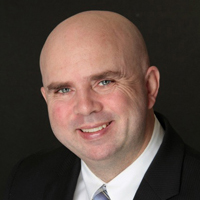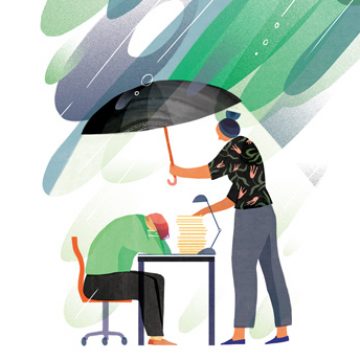In the best of times, addressing a mental-health issue at the office is complicated. So we’ve asked a panel of experts to weigh in on some of the most difficult problems you might face:
Meet our expert panel

Orlando Da Silva
Counsel, Ministry of the Attorney General
Expertise: He’s a mental-health advocate who’s also outspoken about his struggles with depression

Morgan Sim
Associate, Pinto Wray James
Expertise: She practises employment and human-rights law

Darryl Singer
Litigator, Singer Barristers
Expertise: He’s a mental-health advocate who’s also a recovered Oxycontin addict
You’re struggling with a mental health issue that might affect your work. Should you tell your boss?
Orlando Da Silva: Maybe. If it’s a safe environment to talk about mental-health issues and it won’t hurt your career, I don’t see the harm. But it’s very difficult to be sure that it won’t affect your caseload or partnership prospects. It also wouldn’t be the first thing I would do. I would seek out a trusted family member or friend to try to sort out what’s going on with your mood.
Morgan Sim: The question is less about whether you should make a disclosure to your boss and more about how you want to make a disclosure. For example, you could frame your disclosure as a request for accommodation, which has the benefit of reminding your employer of their obligations under the Human Rights Code not to discriminate against employees who may be experiencing a short- or long-term mental-health disability.
Darryl Singer: It depends on where you work, who your boss is and how long you’ve worked there. Consider: Are you at a small firm? Is your boss known to be understanding about these things? Are you working for a larger firm as a typical associate who’s grinding away, and thus don’t know the partners’ attitudes? I wish we had evolved as a profession to the point where the answer to this question could be an unqualified yes.
You’re a partner. The performance of an associate working under you has plummeted and you suspect it may be the result of a mental-health problem. What should you do?
Da Silva: Compassion is a critical component of a healthy workplace. If someone appears to be struggling, approach them quietly. ‘You don’t seem to be yourself. Are things alright?’ Expect that they won’t want to talk, but they’ll remember the offer, which will counter the negative self-talk going on in their mind. If they do talk, be a sympathetic ear and direct them to resources like an employee-assistance program. You don’t have to approach them face to face. It could be a text or an email. I know when I receive messages of support, I read and reread them.
Sim: Employers have a duty to inquire if they think someone may need accommodation. But it can be a difficult and sensitive thing to talk about. It may be helpful to frame the conversation in terms of what supports you can provide. You can even ask, ‘Is there anything we can do for you as your employer? What supports can we provide to you?’
Singer: Have an open and honest conversation. I would say, ‘I have some concerns about your performance, but it seems out of character. I know you to be diligent, but now your work has been sloppy. It makes me think there’s something else going on in your life.’ Let them know there won’t be repercussions for coming forward and that you’re more concerned about their well-being in the long-run than the quality of their work in the short-run.
An employee discloses a mental health condition and asks to be unavailable on evenings and weekends. In this scenario, what’s fair?
Da Silva: If someone is going through a mental-health crisis, but is still attending work and just needs some adjustments, that isn’t hard to address. Team that person up with another lawyer, so clients can still get served during the off-hours. The difficulty here is cultural: the firm may think that the person being accommodated isn’t pulling their weight. That needs to be addressed through anti-stigma and mental-health-awareness campaigns.
Sim: The Human Rights Code requires employers to accommodate a disabled employee up to the point of undue hardship. You don’t have to staff a lawyer on a file that requires them to be available in a way they can’t be due to medical restrictions. But if a law firm doesn’t recognize that there is good and valuable work lawyers can do during the weekday, the Human Rights Tribunal would see that as problematic.
Singer: From my perspective, if you’re not healthy, you’re more likely to make a mistake and piss off a client. As a boss, I’m going to say, ‘Do what you need to do. Family comes first, your health comes first. There’s never a client that’s more important than that.’ If you’re a good boss, that ought to be your priority.
 This story is part of the “How to Help” feature, from our Spring 2018 Issue.
This story is part of the “How to Help” feature, from our Spring 2018 Issue.


